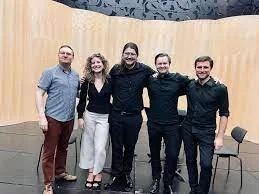AMATIS PIANO TRIO AT JESUS CHAPEL
As darkness fell on the ancient chapel within its cloisters, the sound of Samuel Shepherd’s solo cello echoed round its massive stone walls. After several bars, an unseen violin replied and the mysterious dialogue continued. From behind the trancept Mengie Han walked slowly towards the piano and began to play - then from the depths of the chancel Lea Hausmann materialized, impressive in her red floor length dress .
It was all part of Moorlands an exquisite piece by the young Swedish composer, Andrea Tarrodi, So ethereal was the atmosphere, the rapt audience forgot this was the hottest night - anywhere in Britain - ever. The trio had already worked hard – no cool relaxation for these energetic young musicians – to create a wondrous world of perfect sound synthesis.
Joseph Haydn was first up as he so often is. The father of the trio/quartet chamber style was a predictable choice, but the tight lyrical management of the Piano Trio in E Major – marked shades of allegro throughout -burst joyfully on the ears. Pizzicato violin and cello bobbed up to surprise only to give way to a reprise of the opening, now in A flat major. But it was the long piano melody of the next movement that enchanted me. Lyrical beauty poured from the elegant fingers of Mengie Han , a rhapsodic section full of allusion to Hayden’s inspiration Bach - but stuffed with hints at musical tropes to come.
Energetic Johannes Brahms followed with his Piano trio No 2 in C Major. On a day when the glories of Englishness were on offer, the real triumphs of the European music tradition - strong muscular innovative -dazzled against the feeble efforts of our native composers of the time, Brahms is so adventurous, so modern (this nearly 200 years ago) and if optimism is the coda of the week, try and beat this master composer for resplendent, upbeat extrovert exuberance - expertly rendered by these brilliant young players The scherzo alone is enough to buck anyoneup on a night fit to wilt the perkiest of music goers.
The evening ended with an energetic Piano Trio from Felix Mendelssohn. Like every genre he tried “ I should like to compose a couple of good trios “ he wrote so modestly to his sister Fanny - he soon took control of them to rise as the top trio interpreter of his time . Schumann no less declared this as ‘ the master trio of the age’. This and any other age we might add. Joyful and exuberant and as the glamorous young international musicians ( two Dutch one British) played on in the sultry heat of a thousand year old building, the true nature of optimism lay before us.







